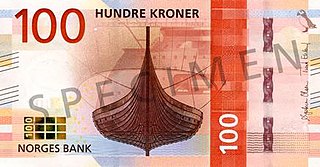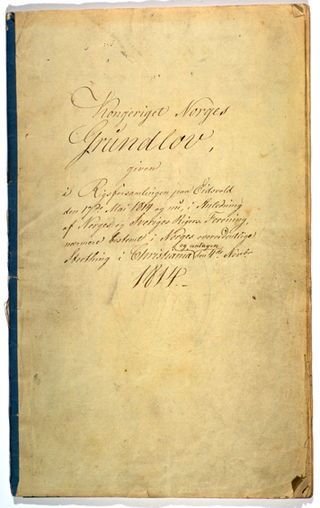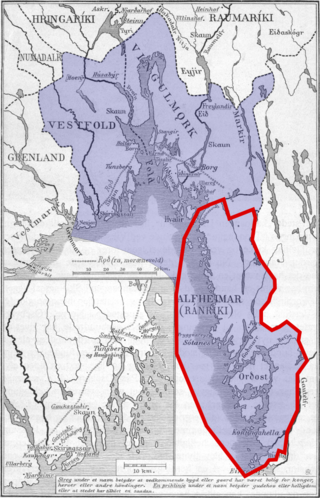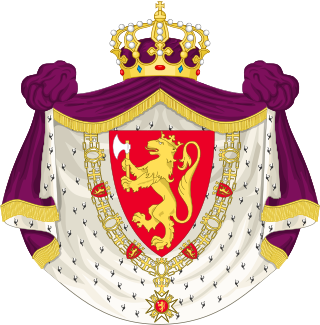Related Research Articles

The krone, plural kroner, is the currency of the Kingdom of Norway. It was traditionally known as the Norwegian crown in English, however this has fallen out of common usage. It is nominally subdivided into 100 øre, although the last coins denominated in øre were withdrawn in 2012.

The Constitution of Norway was adopted on 16 May and signed on 17 May 1814 by the Norwegian Constituent Assembly at Eidsvoll. The latter date is the National Day of Norway; it marks the establishment of the constitution.
The royal motto of the Swedish monarch is a Swedish royal tradition stemming from the early 16th century. All reigning monarchs of Sweden, beginning with Gustav I, have had their own mottos during their respective periods of reign. The Swedish royal motto in many ways is equivalent to a national motto. The tradition among Swedish monarchs, in common with the Danish and Norwegian monarchies, but different from that of most other modern European monarchies, is that the motto is not the same for one dynasty, but is personal to each monarch. Historically the royal motto has been used in connection with the Swedish coat of arms, and until 30 June 2017 it could be seen in print on the 1 krona coin. The new generation of coins does not feature a motto.

"Ja, vi elsker dette landet" is the Norwegian national anthem. Originally a patriotic song, it came to be commonly regarded as the de facto national anthem of Norway in the early 20th century, after being used alongside "Sønner av Norge" since the 1860s. It was officially adopted in 2019. The lyrics were written by Bjørnstjerne Bjørnson between 1859 and 1868, and the melody was written by his cousin Rikard Nordraak sometime during the winter of 1863 and 1864. It was first performed publicly on 17 May 1864 in connection with the 50th anniversary of the constitution. Usually only the first and the last two verses are sung, with the first being by far the most common.

Hjalmar "Hjallis" Johan Andersen was a speed skater from Norway who won three gold medals at the 1952 Winter Olympic Games of Oslo, Norway. He was the only triple gold medalist at the 1952 Winter Olympics, and as such, became the most successful athlete there.

Magnus Haakonsson was King of Norway from 1263 to 1280. One of his greatest achievements was the modernisation and nationalisation of the Norwegian law-code, after which he is known as Magnus the Law-mender. He was the first Norwegian monarch known to have used an ordinal number, although originally counting himself as "IV".

Viken, or Vika, was the historical name during the Viking Age and the High Middle Ages for an area of Scandinavia that originally surrounded the Oslofjord and included the coast of Bohuslän. Its definition changed over time, and from the Middle Ages, Viken included only Bohuslän.
Guttorm Sigurdsson was the king of Norway from January to August 1204, during the Norwegian civil war era. As a grandson of King Sverre, he was proclaimed king by the Birkebeiner faction when he was just four years old. Although obviously not in control of the events surrounding him, Guttorm's accession to the throne under the effective regency of Haakon the Crazy led to renewed conflict between the Birkebeiner and the Bagler factions, the latter supported militarily by Valdemar II of Denmark.

The coat of arms of Norway is the arms of dominion of king Harald V of Norway, and as such represents both the monarch and the kingdom. It depicts a standing golden lion on a red background, bearing a golden crown and axe with silver blade.

The Norwegian monarch is the head of state of Norway, which is a constitutional and hereditary monarchy with a parliamentary system. The Norwegian monarchy can trace its line back to the reign of Harald Fairhair and the previous petty kingdoms which were united to form Norway; it has been in unions with both Sweden and Denmark for long periods.
The Royal mottos or valgspråk/valspråk of the Norwegian monarchs are an old tradition, permanent since the reign of Christian II of Denmark and Norway. The latest three kings have adopted the same motto as their personal motto, Alt for Norge, that has a particularly high standing as it became one of the main symbols of the Norwegian struggle during the German occupation of Norway in World War II.
Ingeborg Eriksdotter was Queen of Norway and the wife of King Magnus VI. She was born a Danish princess, daughter of Eric IV of Denmark. As queen dowager, she played an important part in politics during the minority of her son King Eirik II of Norway in 1280-82.
Sverre Mitsem (1907–2004) was a Norwegian journalist, newspaper editor and article writer. He is known as editor-in-chief of Tønsbergs Blad from 1954 to 1977 and for the column "SORRY" in Aftenposten, which he wrote from 1946 to 1996.

The House of Sverre was a royal house or dynasty which ruled, at various times in history, the Kingdom of Norway, hereunder the kingdom's realms, and the Kingdom of Scotland. The house was founded with King Sverre Sigurdsson. It provided the rulers of Norway from 1184 to 1319.
Alt for Norge is a Norwegian reality television series which debuted in 2010 and appears on TVNorge and hosted by Fridtjof Nilsen. The reality show features Norwegian Americans participating in challenges relating to Norwegian history and culture, competing to win a reunion with their distant Norwegian relatives. The original Norwegian concept has also been exported to Sweden and Denmark.
The UEFA Women's Under-19 Championship 2014 Final Tournament was held in Norway from 15 to 27 July 2014. The first qualification matches were played on 21 September 2013.

H.M. The King’s Commemorative Medal is a royal decoration of Norway. Established in 1906 by King Haakon VII, the medal is awarded to individuals for particularly meritorious service to the King. The medal is awarded in grades, gold and silver. The gold medal ranks 28th in the Norwegian order of wear just below the Antarctic Medal and above The Royal House Centenary Medal. The silver medal ranks 38th in the order of precedence below the King Olav V's 100th Anniversary Medal and above the Defence Service Medal.
Events in the year 1638 in Norway.

Vilde Bøe Risa is a Norwegian professional footballer who plays as a midfielder for Spanish Liga F club Atlético Madrid and the Norway national team.
References
- 1 2 3 4 5 "Municipal mottos" (in Norwegian). Nationen. Retrieved 2012-02-19.
- ↑ "About Tønsberg" (in Norwegian). Tønsberg kommune. Retrieved 2012-02-19.
